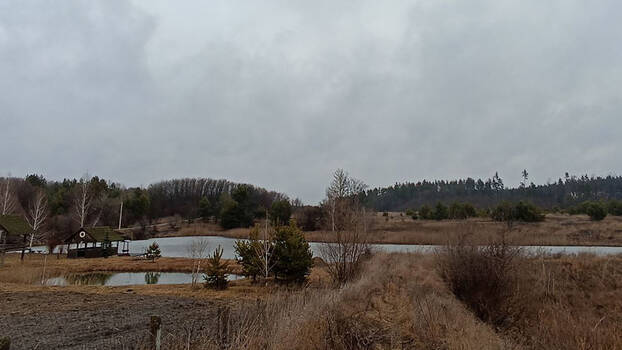
A week of war. I woke from a restless sleep. Something was wrong. Actually, something was right. The way it ought to be in this far-flung village: it was silent. A sprinkling of March snow was dressing up the evergreen pine trees, everything was bathed in the grey-blue light of dawn, everything seemed wet. For a moment, it was truly magical. The artillery guns had fallen silent. The internet was back up. The world seemed to be in order again, and I thought about dozing a little longer, and then it hit me: my meds are back in Kyiv, and the cat’s not doing too well either. That was the price I was paying for talking myself into leaving the city: “It can’t last that long, you’ll be back in three days, four tops.”
Nelia Vakhovska works as a programme manager at the Rosa Luxemburg Foundation’s Kyiv Office and as a translator of Josef Winkler, Martin Pollack, and Arno Schmidt, among others.
This article first appeared in Die Furche. Translated by Joel Scott for Gegensatz Translation Collective.
That was a week ago. Now people are talking about static warfare. The world is clapping their hands for us and shaking their heads, but here, a few dozen kilometres away from me, young men are standing next to old Soviet artillery guns and shooting day and night at the enemy tanks as they move westward. Until today, almost every night, jets flew overhead, their bombs making the forest, the ground, the house tremble. Then we heard the rattling of engines — the remaining artillery guns were needed elsewhere. And then, as if from some enormous drums, the boom-boom-boom returned, off in the distance. But not today. My mind started racing: Had they been destroyed? Are we now just waiting for the Russian tanks to roll in? Is the war over? Were the negotiations successful?
And in this moment of silence, I break down completely and sob like a child, for all the people we’ve lost…
Hope is a terrible thing. When I read the news, look at horrific images of the bombardment of Bucha or Kharkiv, worry about my friends who have stayed behind in Kyiv, I want only one thing — to believe the words of the leadership of the Ukrainian Army, that we’ll make it, that we’ll survive, that we’ll win. Because this is our country. I want to have that hope, despite knowing full well that our losses are obviously being played down, that while Uncle Joe admires us, he’s not going to protect us, that nuclear war is still a real possibility…
This hope is unbearable. And right now, in this moment of silence, I break down completely and sob like a child — for all the people we’ve lost, for the city that I’m so worried about, for my flowers on the balcony, and these men and women over there in the woods, so small and fragile in the face of the monster of war.
Seven days I have spent filled with rage and hatred towards the occupiers, whose leader didn’t even bother to come up with a pretence for the attack. Towards Western politicians who expressed their concerns and sent us weapons instead of trying to negotiate a ceasefire by any means possible. Towards the Western leftists who sit on their cushy sofas accusing us of militarism, worrying about the “everyday Russians” whose lives might be made worse by the sanctions. The very same Russians who admire their president for his machismo and write about banderowzy[1] and chochly[2] on social media with schadenfreude. Who have voted in an autocrat time and again. If my government borrows too much money, I’m not exempt from the debt because I’m a “normal citizen”. If their state invades its neighbour, should the citizens be protected from the consequences? Why are we only seeing tough sanctions now, and not eight years ago? Maybe the madman in the Kremlin would have realized that even his arrogance has to have limits?
Gradually, it’s getting dark in my little village. In my imagination, Kyiv is like a cunning animal. It sits listening for rustling on either side of the banks of the Dnieper, ready to snatch at the dangers in the air and then lick its wounds. I wish it strength and a calm night. Here, my neighbours and I don’t dare to turn on the lights at night — we’re scared. On the other side of the forest, the distant boom-boom rings out again, the Russians are coming with their bombs from above, and I think of an expression in Ukrainian — прихилити небо, to tilt the sky. It’s usually used in the conditional to indicate the intensity of the love and care people have for a child or a loved one: if I could, I would tilt the sky for you. I wish it would protect the people in the forest. All of us. If only I could do that…
The explosions are a good remedy for resignation. They make you flinch. Your hopes are gone, and so are your tears. When my father calls, my voice takes on its usual tone: “Here? Everything is normal. They’re shooting again.”